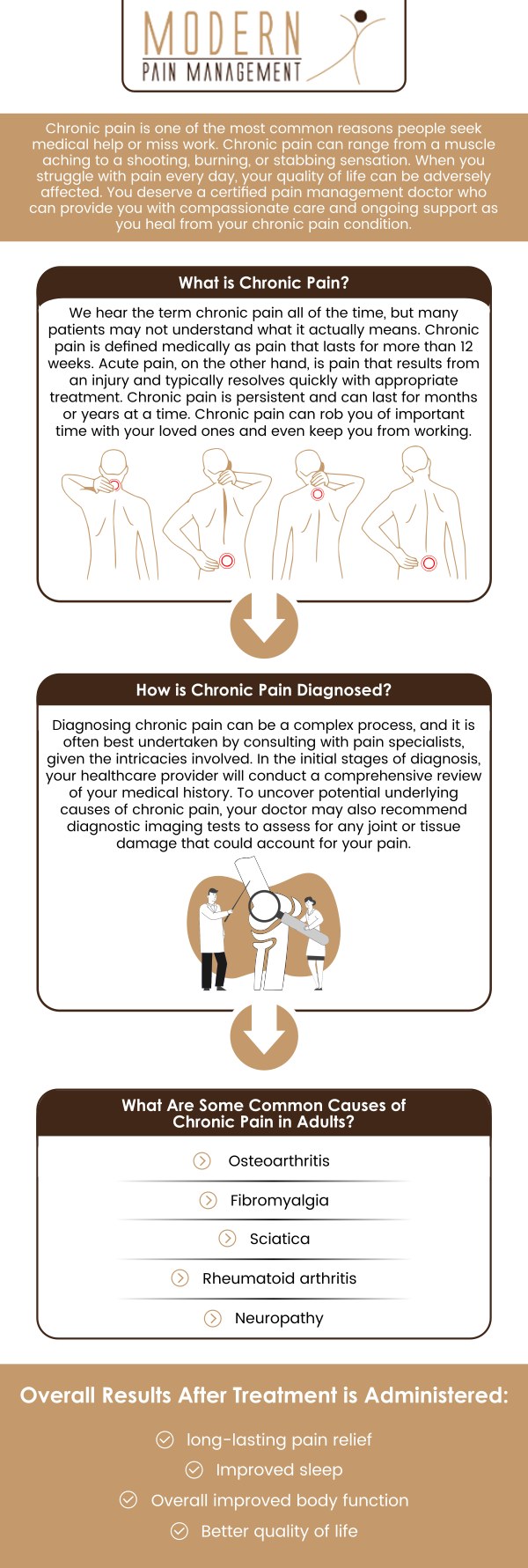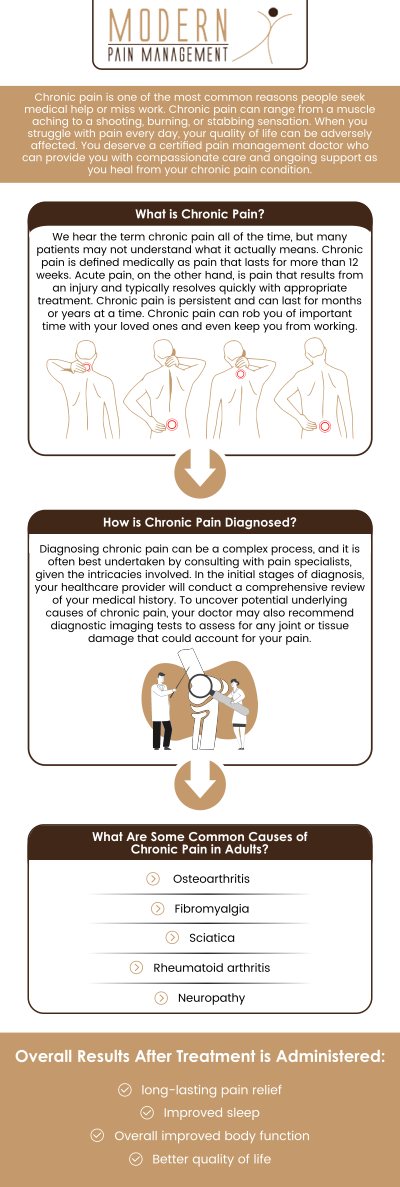What Are the Causes of Chronic Pain?
Chronic pain can result from a variety of conditions, including underlying medical issues such as arthritis, nerve damage, or fibromyalgia, as well as injuries that fail to heal properly. It may also stem from prolonged inflammation, autoimmune disorders, or degenerative conditions like herniated discs. At Modern Pain Management, our board-certified pain management doctor, Dr. George Atallah, D.O., specializes in identifying the root causes of chronic pain and providing tailored treatment plans to help patients regain control of their lives. For more information, please contact us or book an appointment online. We have convenient locations to serve you in Houston TX and Sugar Land TX.




Table of Contents:
What are the common causes of chronic pain?
Can injuries lead to chronic pain even after they heal?
How does inflammation contribute to chronic pain?
Can chronic pain be caused by nerve damage?
At Modern Pain Management, our mission is to help patients navigate the complex world of chronic pain. We understand that chronic pain impacts millions of individuals globally and lasts longer than three months. Its causes are often multifaceted, encompassing both physical and psychological factors.
Whether your pain stems from an improperly healed injury to muscles, bones, joints, or connective tissues, or it’s a result of conditions such as arthritis, fibromyalgia, or back or neck pain, our team of experts is equipped to assist. We also specialize in managing pain related to health conditions like endometriosis, inflammatory bowel disease, migraines, and chronic illnesses such as cancer, sickle cell disease, and multiple sclerosis.
Our team is also well-versed in managing neuropathic pain resulting from conditions like diabetes, shingles, or physical trauma. We understand the long-term pain that certain infections, like shingles and Lyme disease, can cause if not treated promptly.
As aging is a natural process that can contribute to chronic pain, we are prepared to help manage conditions like osteoarthritis, spinal stenosis, and degenerative disc disease. We also offer treatment for fibromyalgia and Complex Regional Pain Syndrome (CRPS), conditions that can cause widespread chronic pain.
We focus on identifying the root cause of your chronic pain to tailor an effective treatment strategy for you. Depending on your specific condition, this may involve medications, physical therapy, injections, surgical interventions, or psychological interventions. Managing your pain is our aim and helps you regain functionality, improving your quality of life.
We understand that pain following an injury can persist long after the injury has healed. There are several possible causes for this, including the nature of the injury, its location, and your body’s unique healing process. Chronic pain may result from injuries that upset the delicate equilibrium of the body’s tissues and neurological system.
Our practice is well-versed in understanding the intricate mechanisms of chronic pain. Whether it’s due to nerve damage (neuropathic pain), heightened pain receptors, persistent inflammation, or changes in the brain and spinal cord that modifies the processing of pain signals (central sensitization), we are equipped to diagnose and treat your pain.
We also recognize the role psychological factors play in chronic pain. Anxiety, depression, stress, and trauma can all amplify pain sensation and make it more difficult to manage. Our team is trained to address these factors, providing a comprehensive approach to pain management.
We understand that certain factors can increase your likelihood of developing chronic pain after an injury, such as the type and severity of the injury, age, health conditions like diabetes or autoimmune disorders, and even genetics. Our personalized approach to pain management takes these risk factors into consideration.
We aim to do not just ease your discomfort but to improve function and enhance quality of life. If you’re experiencing chronic pain following an injury, we urge you to seek the support of our expert team. Our goal is to help you achieve your full potential and manage your pain.
We understand that inflammation is a key player in the development, persistence, and management of chronic pain. Our body responds to injury, infection, or harmful stimuli by initiating inflammation, a protective measure that releases various inflammatory mediators to promote healing. However, when this inflammation doesn’t resolve fully due to persistent infection, autoimmune diseases, or conditions like obesity, it can result in chronic pain.
Chronic inflammation can lead to sensitized pain signaling pathways, causing increased pain sensitivity. It can cause normal sensations to be perceived as painful and even lead to tissue damage that further intensifies pain. Chronic inflammation can also promote the development of pain-sensitizing molecules, such as nerve growth factor (NGF), which can increase the sensitivity of pain pathways.
Persistent inflammation can result in central sensitization, where pain impulses cause the central nervous system to become hypersensitive, leading to increased pain intensity and the spread of pain to other areas of the body.
We use this understanding of the interplay between inflammation and chronic pain to devise effective treatment plans for our patients. We offer strategies such as anti-inflammatory medications, nonsteroidal anti-inflammatory drugs (NSAIDs), COX-2 inhibitors, physical therapy, exercise, and changes in lifestyle that can help with chronic pain relief and inflammation reduction. Relieving chronic pain and enhancing the quality of life for our patients is our top priority.
We understand that chronic pain can rob you of your quality of life, especially when it’s due to nerve damage. Our team of experienced physicians, physical therapists, and mental health professionals specializes in managing and treating chronic pain, utilizing a comprehensive and individualized approach.
Our nervous system is a complex network that carries pain signals from various parts of our body to our brain. Damage to these nerves, also known as neuropathy, can disrupt this communication, leading to persistent, often debilitating pain that lasts longer than 12 weeks, which is classified as chronic pain.
The type and severity of pain you experience can differ depending on where the nerve damage has occurred. Peripheral nerve damage might cause pain in specific areas like hands or feet, while central nerve damage, which impacts the brain or spinal cord, can result in widespread and severe pain.
We understand that neuropathy can be caused by various factors, including injury, surgery, diseases like diabetes, infections, or exposure to toxins. Conditions like sciatica, trigeminal neuralgia, and postherpetic neuralgia, a complication of shingles, can also lead to neuropathic pain, often described as a burning sensation similar to electric shocks.
Our team collaborates closely to develop a tailored treatment plan that takes into account your particular requirements and situation. If you’re dealing with persistent pain, we urge you to consult with our healthcare professionals at Modern Pain Management for an accurate diagnosis and a successful course of treatment.
Chronic pain is not something you have to endure; let us help you regain control over your life. For more information, please contact us or book an appointment online. We have convenient locations to serve you in Houston TX and Sugar Land TX. We serve patients from Houston TX, Sugar Land TX, Pearland TX, Jersey Village TX, Missouri City TX, Stafford TX, and Richmond TX.
ADDITIONAL SERVICES YOU MAY NEED




